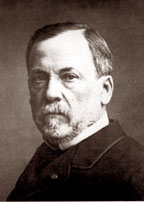
Louis Pasteur: Renowned microbiologist and chemist
Most of you may have drunk pasteurised milk, but have you ever
wondered how this word 'pasteurisation' came about? It's because this
technology known as pasteurisation was introduced by the French
microbiologist and chemist Louis Pasteur.
Besides pasteurisation, which prevented milk and wine from going
sour, some of his other outstanding contributions were, changing the
hospital practices of the day to prevent the spread of germs, the use of
weakened microbes to fight stronger germs and the rabies vaccine.

Pasteur's experiments confirmed the germ theory of disease, that most
infectious diseases are caused by germs. This is one of the most
important foundations in the science of microbiology and the cornerstone
of modern medicine. Although not the inventors of this theory, he, along
with Robert Koch, became known as the 'fathers of germ theory' due to
the many experiments they conducted in this area. They were also the
founders of bacteriology.
Louis Pasteur was born on December 27, 1822, the son of a tanner, in
an area known as Dole in France. He grew up in the town of Arbois.
Although he wasn't initially good at studies, he was skilled in the
drawing of portraits.
However, his father wanted him to pursue his studies seriously and
was encouraged by his school headmaster to apply for the school, Ecole
Normale Superieure, where he was accepted. In 1848, he served briefly as
the Professor of Physics at the Dijon Lycee.
Later, he was appointed Professor of Chemistry at the Strasbourg
University where he met his future wife, Marie Laurent. They had five
children although only two survived into adulthood. In 1854, he was
appointed Dean of the New College of Science in Lille. In 1856, he
became the administrator and director of the Ecole Normale Superieure.
In April 1862, he successfully conducted tests with Claude Bernard
and found that the heating of milk kills bacteria and mould in it,
without destroying the properties of the liquid, thus prolonging its
life. This process came to be called pasteurisation.
He also developed the idea of anaerobiosis, where some
micro-organisms can develop and live without air or oxygen. His work on
chicken cholera led to the improvement of immunisation and also created
the anthrax vaccine, for which he was awarded a patent. Vaccines were
already in use around this time, but his work revolutionised work done
in infectious diseases.
He introduced the rabies vaccine by growing it in rabbits and then
weakening it. Though not a doctor, Pasteur treated a dog-bite victim
with this vaccine, but since the experiment was a success, no legal
action was taken against him and he was treated as a hero.
He died in Dole on September 28, 1895 and was buried in the Cathedral
of Notre Dame.But his remains are now kept at a crypt at the Pasteur
Institute, which he helped set up in 1887.
This institute is dedicated to the study of biology, micro-organisms,
diseases and vaccines. |


